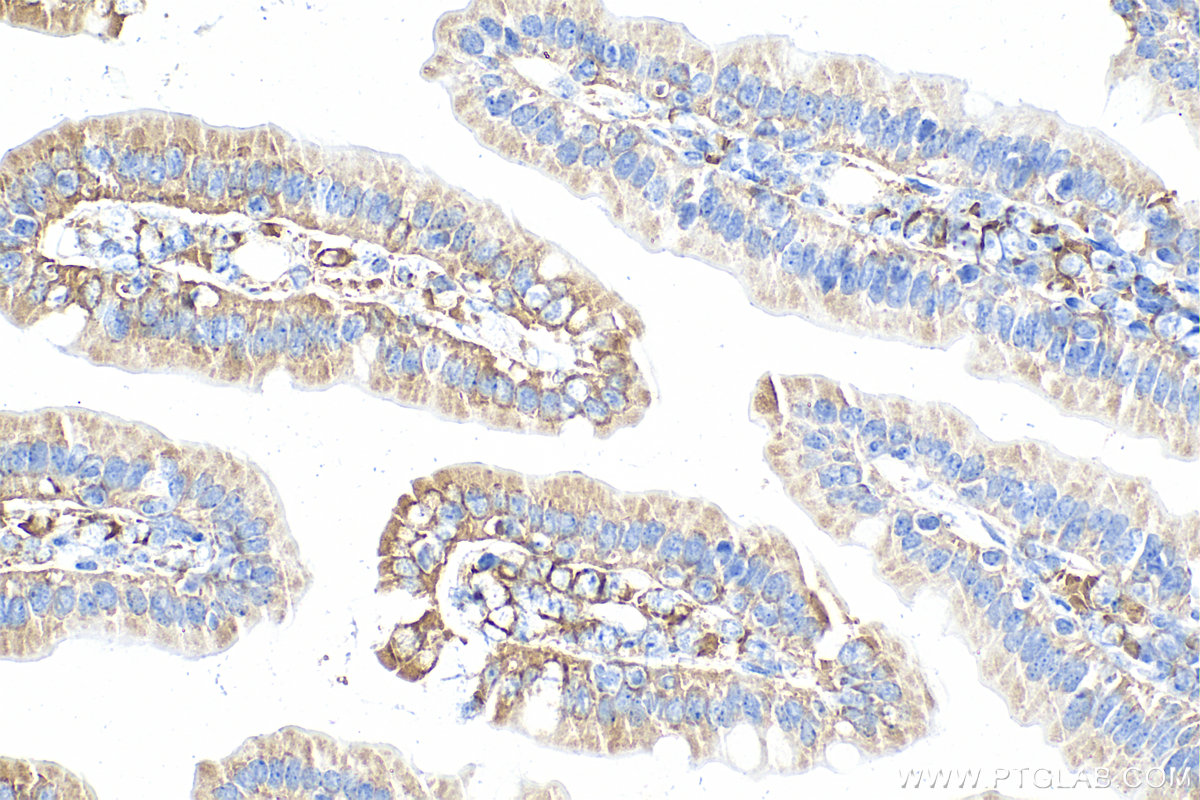验证数据展示
经过测试的应用
| Positive IHC detected in | mouse small intestine tissue Note: suggested antigen retrieval with TE buffer pH 9.0; (*) Alternatively, antigen retrieval may be performed with citrate buffer pH 6.0 |
推荐稀释比
| 应用 | 推荐稀释比 |
|---|---|
| Immunohistochemistry (IHC) | IHC : 1:50-1:500 |
| It is recommended that this reagent should be titrated in each testing system to obtain optimal results. | |
| Sample-dependent, Check data in validation data gallery. | |
产品信息
Biotin-66252 targets APOA4 in IHC applications and shows reactivity with human, mouse samples.
| 经测试应用 | IHC Application Description |
| 经测试反应性 | human, mouse |
| 免疫原 |
CatNo: Ag12454 Product name: Recombinant human APOA4 protein Source: e coli.-derived, PGEX-4T Tag: GST Domain: 23-396 aa of BC074764 Sequence: SADQVATVMWDYFSQLSNNAKEAVEHLQKSELTQQLNALFQDKLGEVNTYAGDLQKKLVPFATELHERLAKDSEKLKEEIGKELEELRARLLPHANEVSQKIGDNLRELQQRLEPYADQLRTQVNTQAEQLRRQLTPYAQRMERVLRENADSLQASLRPHADELKAKIDQNVEELKGRLTPYADEFKVKIDQTVEELRRSLAPYAQDTQEKLNHQLEGLTFQMKKNAEELKARISASAEELRQRLAPLAEDVRGNLRGNTEGLQKSLAELGGHLDQQVEEFRRRVEPYGENFNKALVQQMEQLRQKLGPHAGDVEGHLSFLEKDLRDKVNSFFSTFKEKESQDKTLSLPELEQQQEQQQEQQQEQVQMLAPLES 种属同源性预测 |
| 宿主/亚型 | Mouse / IgG1 |
| 抗体类别 | Monoclonal |
| 产品类型 | Antibody |
| 全称 | apolipoprotein A-IV |
| 别名 | APOA4, apolipoprotein A IV |
| 计算分子量 | 396 aa, 45 kDa |
| 观测分子量 | 45-46 kDa |
| GenBank蛋白编号 | BC074764 |
| 基因名称 | APOA4 |
| Gene ID (NCBI) | 337 |
| RRID | AB_3672377 |
| 偶联类型 | Biotin |
| 形式 | Liquid |
| 纯化方式 | Protein G purification |
| UNIPROT ID | P06727 |
| 储存缓冲液 | PBS with 50% glycerol, 0.05% Proclin300, 0.5% BSA, pH 7.3. |
| 储存条件 | Store at -20°C. Avoid exposure to light. Stable for one year after shipment. Aliquoting is unnecessary for -20oC storage. |
背景介绍
APOA4 is a major protein component of chylomicrons in postprandial lymph and plasma. It is synthesized in the small intestine and the liver, attached to chylomicrons by enterocytes, and secreted into intestinal lymph during fat absorption. APOA4 is intimately involved in metabolism and has protective roles in cardiovascular diseases like atherosclerosis. APOA4 can promote INS secretion and maintain glucose homeostasis. It also has potent antioxidant and anti-inflammatory properties.
实验方案
| Product Specific Protocols | |
|---|---|
| IHC protocol for Biotin APOA4 antibody Biotin-66252 | Download protocol |
| Standard Protocols | |
|---|---|
| Click here to view our Standard Protocols |


